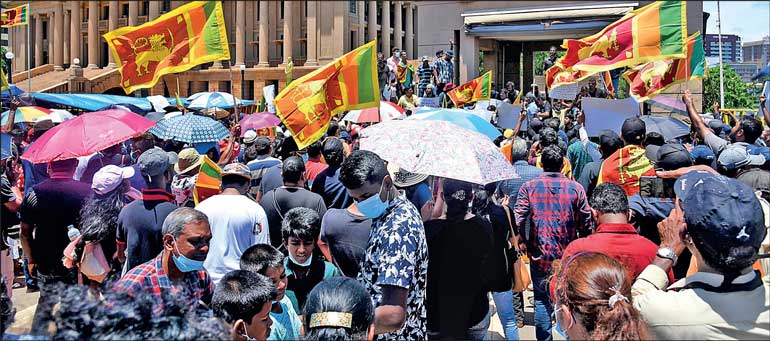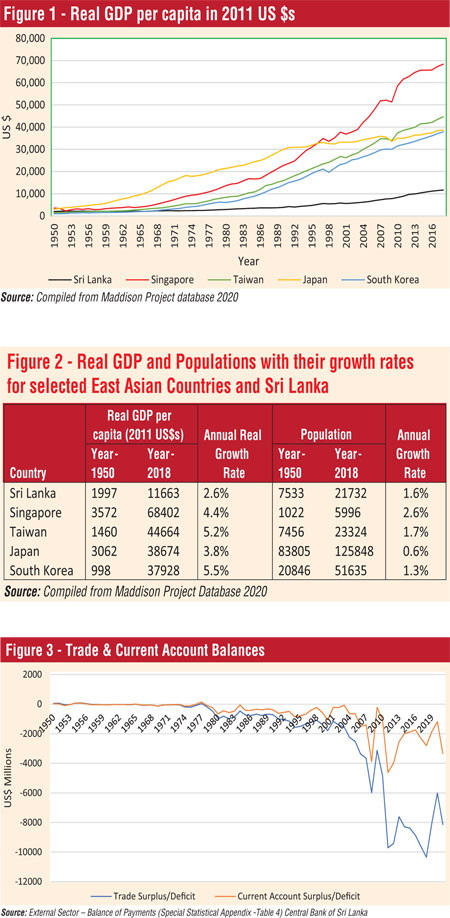Sunday Feb 22, 2026
Sunday Feb 22, 2026
Friday, 1 July 2022 00:13 - - {{hitsCtrl.values.hits}}

When the pressure was at its highest and the Government at its weakest, the protestors should have demanded that the voices of all citizens be heard by having a say in the constitutional reform process, as they matter the most
 Given the events that have unfolded in the last few months, it is understandable that the citizens cry for “Gota Go Home” and some ask for all 225 to go home. However, would asking one, two, or even all 225 of our political leaders to go home solve our problems?
Given the events that have unfolded in the last few months, it is understandable that the citizens cry for “Gota Go Home” and some ask for all 225 to go home. However, would asking one, two, or even all 225 of our political leaders to go home solve our problems?
As will be explained below, the “struggle” should primarily seek some type of “Citizens’ Initiated Referenda (CIR)” as a requirement by law to be incorporated as a crucial provision when amendments to the Constitution are being made. After all, asking the citizens’ voices to be heard directly on constitutional matters is wiser and more democratic than politicians making decisions on behalf of the people given the latter’s self-interest. This, coupled with the politicians’ sheer leadership incompetence, leave the people with nowhere to turn for solutions when economic disasters take place.
Our current economic situation is a result of our long-term development maladies. Compared to the Far East Asian economies, we are no way near their level of success despite being positioned somewhat better than a few of them 6-7 decades ago. Figure 1 shows our pathetic performance vis-à-vis the four Asian countries. Beginning of the 1950s, both South Korea and Taiwan had real incomes less than us, yet by 2018 they have more than three times our income. We have to ask ourselves why and wonder what made this difference – after all, Sri Lankans have performed remarkably well outside their own country in almost every discipline. Could it all be due to our political setup and the lack of proper leaders to take us forward? It seems the answer is in the affirmative! 
For the first time, all Sri Lankans, rich or poor felt the struggle of being in a failed state – long queues, protests, and social unrest resulting in violence. The macroeconomy was in shambles – high inflation, unsustainable foreign debt, fiscal, trade, current and overall balances in deficit as well as reserves hitting rock-bottom so that the country was unable to afford even one week of imports. To make matters worse, we weren’t able to make the interest and loan repayments on foreign debt hence defaulting on our sovereign obligations. The economic disaster was impending. Waiting for the right conditions to emerge – and COVID was the catalyst that finally made it happen. The incompetence of the entire political apparatus was suddenly on display.
The economic script of how the disaster was going to unravel is clear, upon one carefully examining the history of our balance of payments. The trade balance indicates that we have consumed more than we have produced, and the current account shows that we have borrowed more than we have lent. Finally, our overall balance indicates that we have had to dip into the available foreign reserves to defend our currency. Since 1960, except for 1965 and 1977, both trade and current accounts have been in the deficit (Figure 2). With ever-mounting foreign debt, the missing piece was a substantial negative shock, which came in the way of a pandemic that disrupted the capital inflows as exports, remittances, and tourism all suffered.
Due to large capital outflows resulting from imports, fixed principal and interest payments, and rating agencies’ negative evaluation of our debt serviceability, our ability to further finance the current and capital account from the finance account dissipated. It was inevitable that the Central Bank had to let go of the defence of the currency and allow it to devalue. So ended the party of having any time available goodies – petrol, diesel, cooking gas, electricity, milk powder, etc. some cheap and some not so cheap! But who is at fault for this debacle?
The blame has to be shared by all governments who governed us in the recent past. We cannot expect ordinary citizens to understand the economic relationships or how the economic script was written or to have foreseen how it was going to unfold in the end. Even our political leaders wouldn’t have understood the ramifications of their economic script or how to deal with the repercussions since most of them are unqualified to hold the political jobs given their backgrounds.
One of the greatest dangers in a representative democracy, where people place their power in the hands of representatives, is the risk of representatives once elected, abandoning the interests of the voters for their benefit. If we look at the politicians who have governed us, this seems to be the case. If one reflects for a moment on the 225 parliamentarians, what have the seniors achieved all these years, and how many of the new faces are capable of achieving anything substantial for the country’s future? Together with their incompetence and indiscipline, these politicians have become the bane of our progress.
Furthermore, unashamed nepotism and cronyism have run rampant recently leading to incompetency in the public sector too. The competent and diligent public servants, left remaining, have been marginalised and their input made ineffective. Under these circumstances, the future looks incredibly bleak, even if the debt situation is fixed and we go back to business as usual because the East Asian miracle would be unreachable.
When the pressure was at its highest and the Government at its weakest, the protestors should have demanded that the voices of all citizens be heard by having a say in the constitutional reform process, as they matter the most. Otherwise, a new constitution or any amendment would have been decided by the same faces in the Parliament, who themselves were responsible for the failures in the first place. It is a mockery and a travesty of justice to see the same failed politicians forming different groups and alliances, trying to decide on constitutional changes which are not designed to protect the people’s sovereignty – most significantly the right to protect from failed representation. Rather than “Gota Go Home”, whatever the slogan, should have meant “You failed us, now we want laws to protect us from your future mismanagement and failures.” That is a reasonable request considering every citizen of the country has been affected and has realised that some meaningful change has to come about to get them out of this mess. Asking Gota to go home only is not going to bring any meaningful change for our future prosperity. It is only going to delay it because the root causes have not been rectified.
To prevent future debacles, ideally, there need to be mechanisms such as “the Citizens’ Initiated Referenda” (CIR) or a “Recall” incorporated into the provisions of the Constitution. In the former, a legislative initiative allows electors to legislate their legislation, independent of the government. This becomes a necessity particularly when the elected representatives are incapable of handling the affairs of the government or unresponsive to the needs of the people. In the latter, the electorate can petition for the holding of an election to remove public officials for reasons such as corruption or mismanagement of fiscal or monetary affairs that have taken place.
These types of direct democracy devices should only be used under extreme situations like the present, where the people have lost all confidence in the government and crucial amendments to the constitutions are deliberated. Especially, under current circumstances, if the sovereignty is actually with the people, they should exercise this power and not let their representatives who have failed them miserably act on their behalf. Such direct legislation provisions are not unfamiliar, as countries such as Switzerland, Austria, Canada, Italy, and the US have introduced them in their constitutions at different levels of government.
The legal fraternity needs to look into such direct democracy mechanisms to safeguard the interests of citizens. There are pros and cons of such measures, but these need to be debated in public forums and weighed against the existing provisions to see whether enacting such laws could bring about better and more meaningful outcomes in terms of government responsiveness, accountability, and listening to peoples’ voices. As is happening now, the agenda should not be left to the current parliamentarians to decide. The people’s voices need to be directly heard – not through incompetent representatives!
At least, the new generation of young people doesn’t want to be passive bystanders who cast their votes and wait through five years while their elected representatives work for their interests and display party loyalty, and ignore the constituency. People are made to believe that all bad things have happened because of the all-powerful executive presidency. In reality, such beliefs mask the real problems of representative democracy where elected representatives have more or less acted to further their interests to the detriment of the hapless voters.
It is time that voters too have a direct recourse outside the Parliament so that they can truly exercise their sovereignty as stipulated in the Constitution. These direct democracy mechanisms can be the first steps toward competent, disciplined, and accountable political leadership as they provide both the carrot and the stick to do the right thing and pave the way for achieving our miracle!
(The writer is a sessional lecturer in Economics and Finance at both Charles Sturt University and La Trobe University in Australia. He is also a tutor for Public Financial Management at the Centre for Finance & Management Studies (CeFiMS) in the School of Oriental & African Studies (SOAS) at the University of London. He can be contacted by leaving a message at www.ourfuturewechoose.com.)